|
|
|
Sort Order |
|
|
|
Items / Page
|
|
|
|
|
|
|
| Srl | Item |
| 1 |
ID:
169123


|
|
|
|
|
| Summary/Abstract |
This paper focuses on how Airbnb, an internet platform which has created the possibility for mass participation in the tourism market, is resulting in class conflict between new entrants and the ‘traditional’ tourism industry. Specifically, it studies how traditional tourism interests in Barbados have responded to Airbnb by seeking to restrict participation in the industry and presents this as a microcosm of broader class transitions and conflicts associated with new technologies. The paper utilises a Marxist theoretical perspective buttressed by Joseph Schumpeter’s theory of ‘creative destruction’ – places emphasis on the process of destroying productive systems to understand how specific industries expand and survive – and Clayton Christensen’s notion of ‘disruptive innovation’ – a process by which a disruptive product transforms a market – for studying how transformations in technology are impacting the tourism industry in Barbados. Its aim is to provide an account of how the process of disruption is unfolding in Barbados by highlighting the reactions of the main hotel lobby group to Airbnb, while also applying the ideas of Marx, Schumpeter and Christensen as useful theoretical lenses through which to examine the unfolding of the process of disruption of settled class and historical control of a dominant economic sector by new technologies.
|
|
|
|
|
|
|
|
|
|
|
|
|
|
|
|
| 2 |
ID:
169127
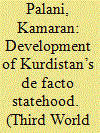

|
|
|
|
|
| Summary/Abstract |
This research aims to analyse the drivers which informed the decision and timing of Kurdistan’s independence referendum on 25 September 2017. Here we argue that any proper examination of these drivers must begin by investigating the relationship between the fight to counter the Islamic State begun in 2014, the disputes arising as a result of Kurdistan’s presidential election issue in 2015 and the internal political rivalry exacerbated by the question of whether to hold a referendum. The findings of this article highlight the centrality of de facto entities’ internal governance in their struggle towards statehood. The fight against IS served as a primary driver in influencing the timing and the approach of the September 2017 referendum. While the 2015 political deadlock resulting in the illegal extension of Barzani’s presidency was not a determining factor leading to the referendum, nonetheless it quickened the process and influenced the timing.
|
|
|
|
|
|
|
|
|
|
|
|
|
|
|
|
| 3 |
ID:
169126


|
|
|
|
|
| Summary/Abstract |
Turkey recently initiated a political change by replacing its parliamentary model with the presidential governmental system (PGS) to achieve, inter alia, a structural transformation from an efficiency-driven to an innovation-driven model of growth. To investigate the PGS’s potential for mediating such a change, this paper uses four key concepts of institutionalist analysis: systemic governance, credible commitment, institutional fragmentation and institutional traps. In doing so, the paper concludes that the PGS’s potential to unleash a structural transformation towards an innovation-driven and high growth depends on the prospect of its mediating an imperative commitment in political and economic governance. This prospect proves to be weak due to both the PGS’s institutional pillars and the path-dependent dynamics of the country’s trap in efficiency-driven growth that have become embedded under a parliamentary model.
|
|
|
|
|
|
|
|
|
|
|
|
|
|
|
|
| 4 |
ID:
169122
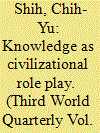

|
|
|
|
|
| Summary/Abstract |
Colonial and postcolonial relations have always constituted sites of knowledge production in the Global South. This is particularly noticeable when it comes to the production of knowledge of a Global South self vis-à-vis the West. However, the literature has not seriously attended self-knowledge production in the Global South with regard to non-Western others. The paper compares South and Southeast Asian think tanks to reflect upon a common identity strategy of small nations to become a civilizational bridge between competing major neighbours. Specifically, China experts in these areas host more or less a common wish or even a desire to be a bridge over the difference of China and its potential rival in India, the West, or both. The bridge role is a rare sensibility in the postcolonial critique of the West. Watching China from its Southern Third World neighbourhood incurs such an agenda. Relying on interviews of retired diplomats and think tank experts, the paper also discusses how the abovementioned methodological characteristics affect the enactment of the bridge role.
|
|
|
|
|
|
|
|
|
|
|
|
|
|
|
|
| 5 |
ID:
169124


|
|
|
|
|
| Summary/Abstract |
Paraguay is often described as a territory of drug trafficking, smuggling and commercial piracy. However, the country remains understudied by academics researching criminality and illegal markets. Pedro Juan Caballero, a city located on the northern border with Brazil, is an interesting case study to illustrate how legality and illegality merge in Paraguay to create hybrid social orders. The daily life in the city, one of the best places in the world for cultivating marijuana, unfolds between the higher homicides rates and some of the lowest levels of common criminality in Paraguay. Far from being a matter of state weakness, the expansion and tolerance of illegal activities is framed within a cluster of order that combines both rational legal practices and neo-patrimonial norms. The presence and roles of state institutions are re-signified, generating alternative hierarchies, practices and values to supply social, political and economic outcomes. Through in-depth interviews with key informants, ethnography visits and analyses of aggregated data, this paper describes the hybrid order of Pedro Juan Caballero by tallying the incentives that encourage social and institutional tolerance of illegality and describes how illegal practices create access to goods, services, protection and expectations not provided by the legal framework.
|
|
|
|
|
|
|
|
|
|
|
|
|
|
|
|
| 6 |
ID:
169119
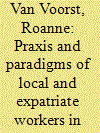

|
|
|
|
|
| Summary/Abstract |
This paper discusses practices and paradigms that expatriate and national humanitarian aid workers use to deal with major problems they encounter in their daily work. It views ‘Aidland’ as an arena where different actors encounter, negotiate and shape the outcome of aid. One of the main findings is that there are consistent differences in the way expatriate and national aid actors perceive problems in their field, as well as in the way they respond to these issues. The paper shows that these perceptions often translate into heterogeneous paradigms and practices between expatriate and national staff, particularly around remote control aid, partnerships and donor reporting. These findings are highly relevant in the current context of ‘localisation’, suggesting that the so-called North/South divide continues to exist and more explicit attention should be given in aid research to the heterogeneous strategies of different actors working in the aid sector. The paper is based on analysis of data derived from a multiple-round Delphi expert panel study involving 30 highly experienced humanitarian aid practitioners.
|
|
|
|
|
|
|
|
|
|
|
|
|
|
|
|
| 7 |
ID:
169121
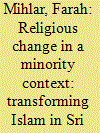

|
|
|
|
|
| Summary/Abstract |
Scholarly work exists on how Muslim minority positioning affects identity and politics, but what is less known is its impact on religion. Sri Lanka’s 9% Muslim population, the country’s second largest minority, has undergone a series of recent changes to religious identity, thinking and practice, which have been shaped by its relationship to the dominant and warring ‘ethnic others’. As Sri Lanka plunged deeper into armed conflict in the 1990s, Muslims experienced significant shifts in religious thinking and practice, identifying strictly with a more ‘authentic’ Islam. After the war ended in 2009, Muslims became the target of majoritarian Sinhala-Buddhist violence, resulting in a reinterpretation of Islam and a counter process of change. Using the Sri Lankan Muslim case study to engage with scholarly critiques of majority–minority binaries, this article analyses how religious change is brought about through the interjection of minority status with ethno-nationalisms and conflict. Its focus on Islam in Sri Lanka contributes to area studies and to Islamic studies, the latter through a rare analysis of Islamic reform in a Muslim minority context.
|
|
|
|
|
|
|
|
|
|
|
|
|
|
|
|
| 8 |
ID:
169125


|
|
|
|
|
| Summary/Abstract |
Urban development, and particularly the improvement of basic services delivery, is still approached in mostly technical terms by international development actors and municipalities of the Global South. Sanitation planning, for instance, remains the realm of engineers despite decades of evidence that conventional approaches focusing on infrastructure upgrading have failed to tackle socio-environmental challenges. Against this background, this paper explores sanitation planning in Mandalay, the second largest city of Myanmar. Here, the Asian Development Bank and a French consulting firm have seized the opportunity created by the country’s recent opening to embark with the municipality on a multi-million dollar scheme: the Mandalay Urban Services Improvement Project (MUSIP). Drawing upon insights from critical development studies, the paper argues that the MUSIP can be interpreted as an ‘anti-politics machine’ that ignored local needs and proposed disputable solutions to local sanitation challenges. The paper further explores how this machine jeopardised urban development in Mandalay more generally, and was eventually challenged by the municipality. The paper concludes that the case is not unique and illustrates how urban development is today being reshaped throughout Myanmar, while it also shows the continued relevance of the ‘anti-politics’ framework to understand contemporary urban development assistance projects.
|
|
|
|
|
|
|
|
|
|
|
|
|
|
|
|
| 9 |
ID:
169120
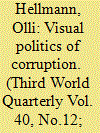

|
|
|
|
|
| Summary/Abstract |
Despite the fact that corruption is essentially invisible, communication campaigns by the global anti-corruption industry regularly feature photographic images. So far, however, we do not know much about the narratives that are encoded in these images. Through the theoretical lens of postcolonialism, this paper takes a first step towards developing an understanding of the visual representation of corruption. Specifically, the paper applies semiotic and iconographic methods to two photography competitions run by Transparency International – the major non-governmental player in the anti-corruption industry. The analysis shows, first, that the anti-corruption industry reinforces colonial stereotypes, suggesting that the ‘sinful’ and ‘irrational’ Global South is waiting to be civilised by the North. Second, through its visual imagery, the anti-corruption industry also emphasises ideas of a ‘humanitarian family’, which serves to cover up the North’s role in transnational webs of corruption. These findings are triangulated with semiotic/iconographic analyses of the Transparency International logo and the Corruption Perceptions Index map.
|
|
|
|
|
|
|
|
|
|
|
|
|
|
|
|
|
|
|
|
|